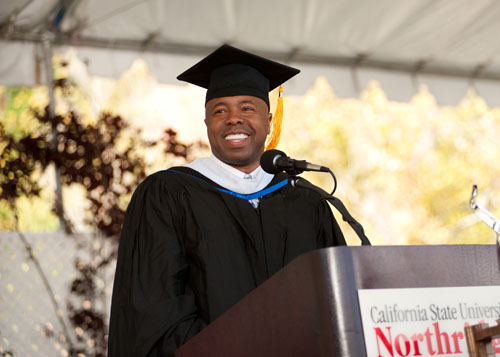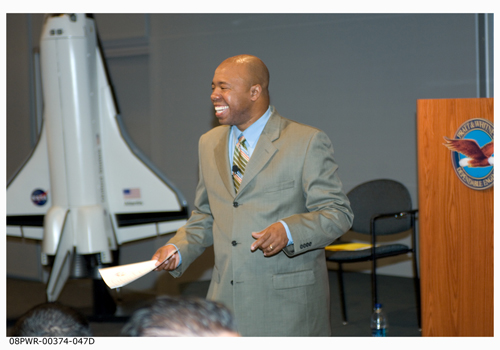Tony Magee combines engineering with inspiration

Unlike most engineers, Tony Magee (’93, Industrial Engineering) didn’t have a particular affinity for math and science as a kid. Growing up in the Nickerson Gardens housing project in Watts, the son of a single mother, he wanted, above all, to escape poverty. The only role model he had was his cousin, Darryl Claiborne (’81), who had earned a degree from CSUN and become an industrial engineer. Hungering for the life he saw his cousin leading, Magee wondered if he could become an engineer too. Claiborne encouraged him, helping him master mathematics and mentoring him in the skills that eventually allowed Magee to enroll at CSUN as an industrial engineering major.
At college he found even more encouragement, from various people who convinced him he could succeed as an engineer, especially Behzad Bavarian, now chair of the Department of Manufacturing Systems Engineering and Management, who became his mentor.
“When we met, I was just a young lad who didn’t really know what direction I was headed,” he recalls. “I just wanted to be present for whatever opportunities happened. Dr. Bavarian adopted me in every way, just like you’d adopt an orphan. The guy basically said, ‘Get in the car,’ and we’ve been riding ever since.”
After Bavarian persuaded him to attend a summer program in materials science and engineering at Lehigh University, Magee returned to earn his bachelor’s degree from CSUN, then went on to become the first African American to earn a master’s degree in materials science at Lehigh. Following a summer at Oak Ridge National Laboratory, Magee returned to California in 1996 and took a position at Boeing Rocketdyne (now Pratt & Whitney Rocketdyne) in forensic metallurgy and failure analysis for the Space Shuttle Main Engines. He had realized his dream of becoming an engineer. But having gained confidence in his capabilities, he wasn’t about to stop there.
 In 1997, Bavarian asked him to teach the college’s introductory class in materials science and engineering. Initially the assignment was for one semester, but it quickly became a labor of love—one he has continued to pursue ever since. A year later, recognizing his gift for communication and relating to people, he entered the MBA program at Pepperdine University, and as part of the program, he studied abroad at Oxford University in England. At the same time, he launched a second career as a motivational speaker and success coach, eventually building it into a going concern called PlatinumStar Life Strategies.
In 1997, Bavarian asked him to teach the college’s introductory class in materials science and engineering. Initially the assignment was for one semester, but it quickly became a labor of love—one he has continued to pursue ever since. A year later, recognizing his gift for communication and relating to people, he entered the MBA program at Pepperdine University, and as part of the program, he studied abroad at Oxford University in England. At the same time, he launched a second career as a motivational speaker and success coach, eventually building it into a going concern called PlatinumStar Life Strategies.
Since earning his MBA in 2000, he has continued to work at Pratt& Whitney Rocketdyne, joined the MSEM Industry Advisory Board, written a bestselling book, Can’t Shove a Great Life into a Small Dream, and amassed a client list for PlatinumStar that reads like a Who’s Who of the corporate, nonprofit and educational worlds— all while being a husband and father to five children. And yet he shrugs off suggestions that he possesses superhuman energy, talent or powers of concentration, insisting that anyone can achieve his or her dreams as he did.
“I was a penny stock, and a few people said I’m going to invest in him—an undervalued gem that would bring an excellent return on their investment,” he explains. “And in that spirit I live my life. Because of all those people who helped me, much is expected of me. I wake up every day to inspire someone.”
